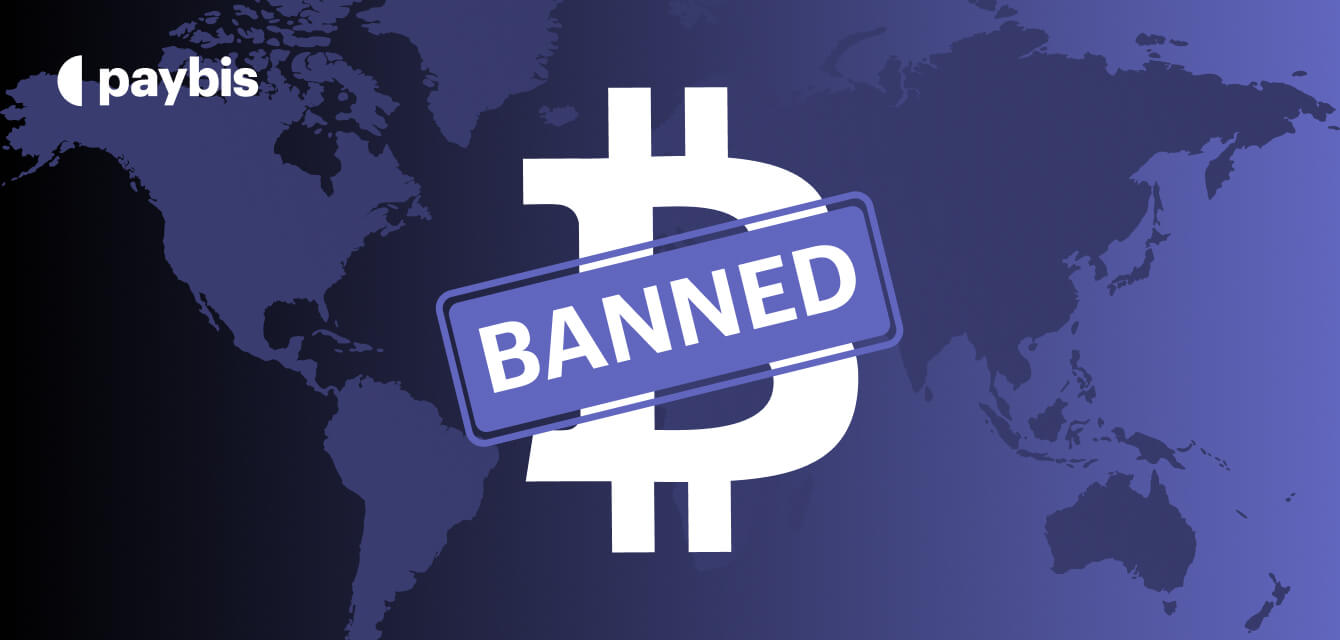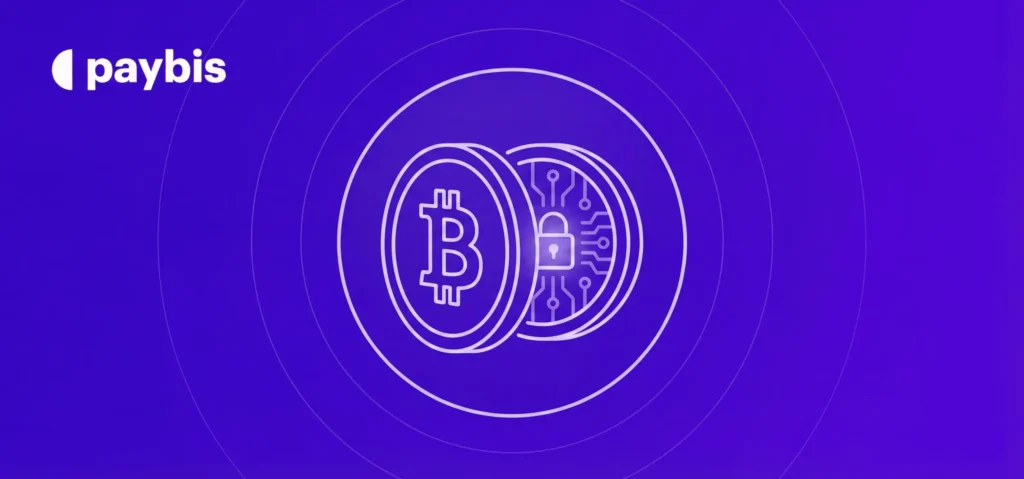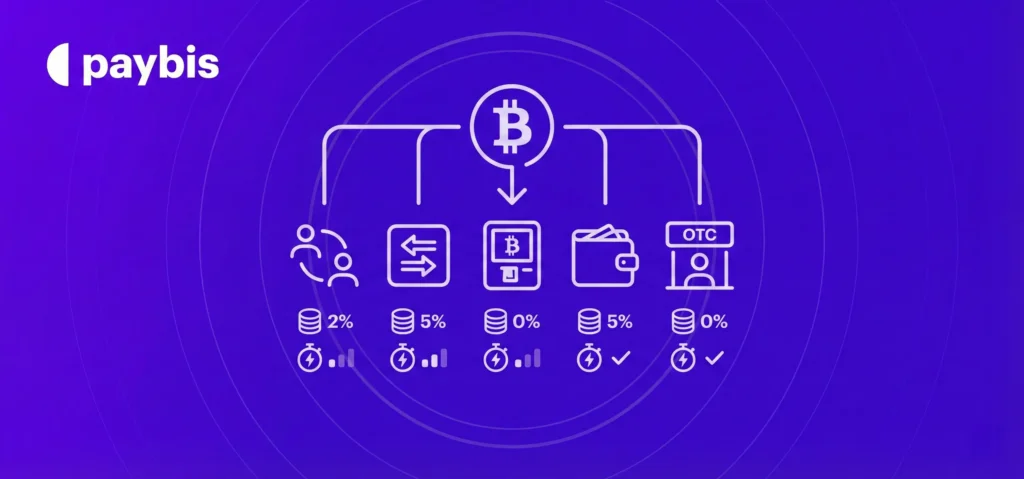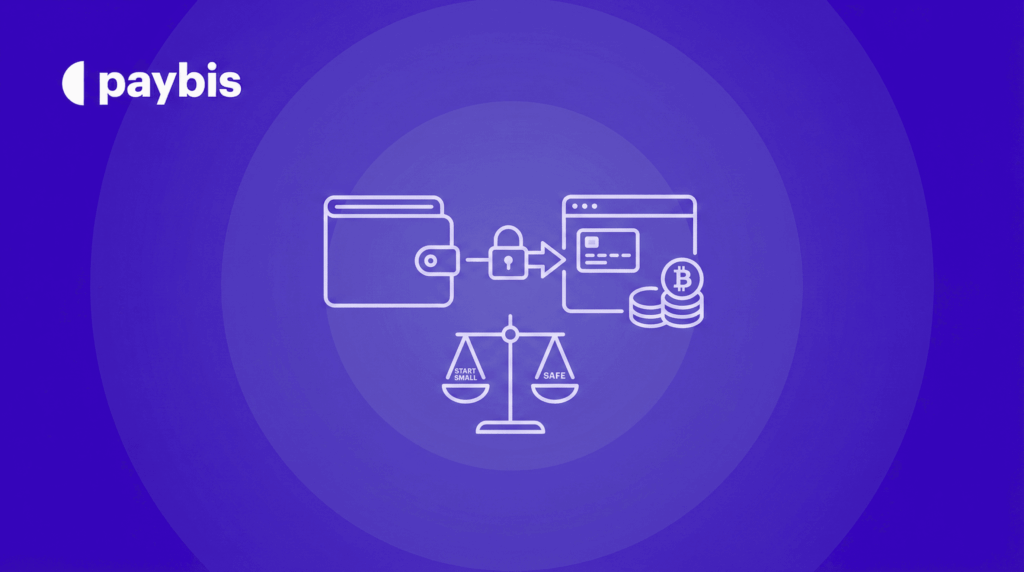Where Is Cryptocurrency Legal? A Look Into Where is Bitcoin Illegal and Legal
Bitcoin has been a revolutionary invention in the world of digital currencies. Its decentralized nature and the promise of security and anonymity have made it a popular choice for many individuals and businesses worldwide.
However, not all countries have embraced this new form of currency with open arms.
In this article, we will see where is cryptocurrency legal and where is Bitcoin illegal.
Table of contents
- Current and Proposed Cryptocurrency Regulations
- Which Countries Have a Banking Ban on Bitcoin?
- Is Bitcoin legal in the US?
- Is BTC legal in Canada?
- Is Bitcoin legal in China?
- How to Buy Bitcoin in Algeria?
- How to buy Bitcoin in Iran?
- How to Buy Bitcoin in Ecuador?
- How to buy Bitcoin in Colombia?
- How to buy Bitcoin in Canada?
- Top 10 Countries that Use Bitcoin
- Where is Bitcoin Mining Illegal?
- Paybis Supported Countries
- Conclusion
- FAQ
Current and Proposed Cryptocurrency Regulations
The current and proposed cryptocurrency regulations vary from country to country. There are numerous countries that have either already regulated or proposed regulation for cryptocurrencies, including Bitcoin.
There are a few countries, like the Republic of El Salvador, that have fully embraced Bitcoin and have made it a legal tender. However, regulations from countries like the USA, UK, and EU will have a greater impact on the global outlook of Bitcoin.
- The Markets in Crypto-Assets Regulation (MiCA): MiCA is a proposed regulation by the European Union that would govern the entire cryptocurrency ecosystem. MiCA would require cryptocurrency exchanges and other businesses that deal with cryptocurrencies to register with government agencies, restrict the use of cryptocurrencies for certain purposes, and impose penalties for non-compliance.
- The Digital Asset Regulation (DAR): The DAR is a proposed regulation by the United States Securities and Exchange Commission (SEC) that would regulate cryptocurrencies as securities. The DAR would require cryptocurrency exchanges and other businesses that deal with cryptocurrencies to register with the SEC and comply with the same regulations as traditional securities exchanges.
- The Stablecoin Tethering and Bank Licensing Enforcement (STABLE) Act: The STABLE Act is a proposed regulation by the United States Congress that would regulate stablecoins. Stablecoins are cryptocurrencies that are pegged to a fiat currency, such as the US dollar. The STABLE Act would require stablecoin issuers to be licensed by the Federal Reserve and to maintain reserves in fiat currency that are equal to the value of the stablecoins they issue.
Which Countries Have a Banking Ban on Bitcoin?
One of the primary ways governments exert control is through their banking systems.
For example, countries such as Bolivia, Bangladesh, Nepal, and Ecuador have implemented a complete ban on Bitcoin, making it illegal to use or trade cryptocurrency within their territories.
The reasons for these bans vary, but one common concern is the lack of governmental control over Bitcoin and other cryptocurrencies. Authorities worry that the decentralized nature of cryptocurrencies might bypass their monetary policies and regulations.
Additionally, issues like money laundering, fraud, and the financing of illegal activities have raised significant concerns.
Here’s a look at which countries have a banking ban on Bitcoin.
Bolivia
Bolivia, a landlocked country in South America, has taken a strong stance against Bitcoin. The Bolivian government believes that cryptocurrencies’ unregulated nature threatens its economy and financial stability.
In 2017, the BCB issued a statement warning citizens about the risks of investing in cryptocurrencies. The statement said cryptocurrencies are “not a legal tender” in Bolivia and “incur potential risks of generating economic losses to their operators and holders.”
In 2020, the BCB issued a new resolution clarifying the ban on cryptocurrencies. The resolution said that banks and other financial institutions are prohibited from providing services related to cryptocurrencies, such as purchasing, selling, and transferring.
By banning Bitcoin through its banking system, Bolivia aims to protect its citizens from potential risks associated with digital currencies.
Bangladesh
In Bangladesh, the central bank has issued a directive prohibiting the use of Bitcoin and other cryptocurrencies.
In 2017, the Central Bank of Bangladesh (BB) issued a directive prohibiting the use of Bitcoin and other cryptocurrencies. The BB cited concerns about the potential risks associated with cryptocurrencies, such as their volatility, their use for illegal activities, and their potential to undermine the country’s financial stability.
In 2021, the BB issued a new directive clarifying the cryptocurrency ban. The directive said anyone caught using or trading cryptocurrencies could face up to 12 years in prison.
The Bangladeshi government has also taken steps to crack down on cryptocurrency mining. In 2021, the government arrested three people in the city of Dhaka for transacting with Bitcoin. The raid resulted in the seizure of mining equipment and the arrest of several people.
Nepal
Nepal, a country close to the Himalayas, has also implemented a banking ban on Bitcoin.
In September 2021, Nepal’s central bank, the Nepal Rastra Bank (NRB), issued a directive prohibiting banks and financial institutions from providing services related to cryptocurrencies, including the purchase, sale, and transfer of cryptocurrencies.
The NRB cited concerns about the potential misuse of cryptocurrencies for illegal activities, including terrorism financing, as the reason for the ban.
Despite the ban, there is still some evidence of cryptocurrency activity in Nepal. For example, a report by Chainalysis found that Nepal ranked 16th on the Global Crypto Adoption Index in 2022. This suggests that some people in Nepal still use cryptocurrencies, although they are technically illegal.
Morocco
The Moroccan government has implemented a ban on the use of Bitcoin and other virtual currencies within its borders since 2017. This decision stems from their concerns regarding these decentralized digital assets’ speculative and risky nature.
One of the main reasons behind Morocco’s ban on cryptocurrencies is the absence of a central authority or underlying assets that support these virtual currencies. The government believes that without such backing, cryptocurrencies pose a significant risk to individuals who engage in transactions involving these digital assets. They fear that unsuspecting individuals could face financial losses without any legal protection.
Further, the Moroccan government aims to safeguard its official currency, the dirham, and prevent capital outflows. By banning the use of cryptocurrencies, they hope to maintain stability within the country’s financial system and ensure that the dirham remains the primary medium of exchange.
Qatar
In February 2018, the Qatar Central Bank (QCB) issued a circular warning against the use of Bitcoin and other virtual currencies within the country.
The circular stated that the QCB does not recognize Bitcoin or other virtual currencies as legal tender and that any transactions involving these currencies are not protected by the Qatari financial system.
The QCB cited several concerns about the use of cryptocurrencies, including their volatility, their potential for use in illegal activities, and their lack of regulation. The QCB also said that the use of cryptocurrencies could undermine the stability of the Qatari riyal and the country’s financial system.
The circular did not explicitly ban the use of cryptocurrencies in Qatar, but it did warn that anyone who uses or trades cryptocurrencies could face legal consequences. The QCB also said that it would take “appropriate measures” against any financial institutions that facilitate transactions involving cryptocurrencies.
Is Bitcoin legal in the US?
Is Bitcoin legal in the US? Yes, people can buy, sell and trade BTC in the United States.
The US has taken a relatively favorable stance towards Bitcoin, considering it legal and recognizing it as a digital asset. The Internal Revenue Service (IRS) treats Bitcoin as property, subjecting it to taxation.
Additionally, the Securities Exchange Commission (SEC) has recently acknowledged that Bitcoin is not a security as it is “sufficiently decentralized.”
Bitcoin’s legal status in the United States has been a topic of much discussion and debate. While the federal government has generally accepted Bitcoin as a legal form of currency, individual states within the US may have specific regulations governing cryptocurrencies.
This decentralized approach to regulation has led to a patchwork of laws and guidelines that can vary significantly from one state to another.
Is BTC legal in Canada?
Is BTC legal in Canada? Yes.
Canada’s stance on Bitcoin is clear: it is legal and regulated. The country has taken significant steps to ensure the integrity of the cryptocurrency market while fostering innovation and growth.
The country has even become a hub for cryptocurrency businesses and held its first Bitcoin ETF (Exchange Traded Fund) in 2021, providing investors with exposure to Bitcoin on the stock market.
When it comes to the legality of Bitcoin in Canada, the country has taken a progressive approach. Recognizing the transformative power of cryptocurrencies, the Canadian government has actively worked towards creating a regulatory framework that balances innovation and investor protection.
In 2014, the Financial Transactions and Reports Analysis Centre of Canada (FINTRAC) declared that digital currencies, including Bitcoin, fall under the definition of “money services businesses” and are subject to the Proceeds of Crime (Money Laundering) and Terrorist Financing Act.
This means that Bitcoin exchanges and other cryptocurrency service providers must register with FINTRAC and comply with anti-money laundering and know-your-customer regulations.
Is Bitcoin legal in China?
China, one of the major players in the global economy, has taken a firm stance against Bitcoin.
The Chinese government has banned all cryptocurrency exchanges and Initial Coin Offerings (ICOs). The rationale behind this decision lies in the government’s concerns over money laundering, fraud, and the volatility of cryptocurrencies.
Additionally, China’s central bank aims to maintain control over the country’s financial system and prevent capital outflows.
The ban on cryptocurrency exchanges and ICOs has significantly impacted the cryptocurrency market in China. Many Chinese investors and cryptocurrency enthusiasts have been forced to find alternative ways to trade and invest in cryptocurrencies. This strict regulatory environment has led to the rise of underground Bitcoin trading in the country.
Despite the ban, individuals in China can still possess Bitcoin, but they are restricted from using it for financial transactions. This means that while they can hold onto their Bitcoin as a store of value, they are unable to use it as a medium of exchange or as a means to transfer funds.
Another consequence of the ban on cryptocurrency exchanges is the increased risk of scams and fraudulent activities. Without regulated platforms, individuals looking to buy or sell Bitcoin must rely on unverified sources and risk falling victim to scams.
So, is Bitcoin legal in China? No, many aspects of it, like mining, are not legal.
How to Buy Bitcoin in Algeria?
In Algeria, Bitcoin is considered illegal. The Algerian government believes that cryptocurrencies pose a threat to the country’s national currency, the dinar.
The Central Bank of Algeria has issued a statement warning citizens against using Bitcoin and other similar digital currencies. They argue that cryptocurrencies are not backed by any physical assets, making them highly volatile and risky. Further, the government is concerned about the potential for money laundering and financing of illegal activities.
The decision to ban Bitcoin in Algeria has sparked a heated debate among economists and technology enthusiasts. While some argue that cryptocurrencies have the potential to revolutionize the financial industry and provide greater financial inclusion, others share the government’s concerns about their unregulated nature.
However, it is worth noting that the ban on Bitcoin does not necessarily mean that Algerians have entirely abandoned the idea of digital currencies. Despite the legal restrictions, there are reports of a thriving underground Bitcoin market in the country.
This underground market operates in a clandestine manner, with individuals using various techniques to conceal their transactions from authorities.
While the Algerian government’s concerns about money laundering and illicit activities are valid, critics argue that a blanket ban on cryptocurrencies may not be the most effective solution.
They suggest that instead of outright prohibition, the government should focus on implementing robust regulatory frameworks to address the risks associated with digital currencies.
By introducing proper licensing and oversight mechanisms, Algeria could potentially harness the benefits of cryptocurrencies while mitigating the associated risks.
How to buy Bitcoin in Iran?
The Iranian government has taken a complex approach to regulating cryptocurrencies. In 2019, the government banned the trading of cryptocurrencies inside the country, but it allowed the use of cryptocurrencies like Bitcoin to pay for imports.
In 2022, the government further clarified its stance on cryptocurrencies, stating that they can be used for legal purposes, but they are not legal tender.
The government’s stance on cryptocurrencies is likely to continue to evolve as the technology develops. However, it is clear that the government is not currently supportive of the use of cryptocurrencies for speculative purposes.
Here are some ways that Iranians can buy Bitcoin:
- Peer-to-peer exchanges: These exchanges allow users to buy and sell Bitcoin directly with each other, without the need for a third party.
- Decentralized platforms: These platforms allow users to trade Bitcoin and other cryptocurrencies without the need for a central authority.
- Legal mining: Iranians can legally mine Bitcoin through authorized channels. However, the government has imposed strict limits on the amount of electricity that can be used for mining.
How to Buy Bitcoin in Ecuador?
In 2014, the Central Bank of Ecuador issued a statement declaring that Bitcoin is not legal tender and cannot be used as a payment method in the country.
In 2018, the Ecuadorian government went a step further and banned the use of Bitcoin and other cryptocurrencies by financial institutions. The ban was imposed through a new law that regulates the use of electronic money in the country. The law defines electronic money as “any digital representation of value that is not legal tender and is not issued or guaranteed by a central bank or public authority.”
That said, the country does not penalize or punish citizens for holding Bitcoin. You can buy Bitcoin in Ecuador through Paybis.
The legal status of Bitcoin in Ecuador is still evolving. It is possible that the government’s stance on Bitcoin could change in the future.
How to buy Bitcoin in Colombia?
Colombia has adopted a relatively open approach to Bitcoin and cryptocurrencies, recognizing them legally. Buying Bitcoin in Colombia is straightforward, with various established cryptocurrency exchange platforms like Paybis.
Interested individuals can create accounts on these platforms, complete the necessary verification process, and start buying and selling.
You can easily buy Bitcoin in Columbia from Paybis.
How to buy Bitcoin in Canada?
In 2021, Canada made history by becoming the first country to approve a Bitcoin ETF. The Purpose Bitcoin ETF, launched by Purpose Investments, allows investors to gain exposure to Bitcoin through a traditional stock exchange.
This landmark event has opened up new avenues for investors who want to participate in the cryptocurrency market without directly owning and managing Bitcoin.
You can buy Bitcoin in Canada through Paybis or purchase it in the form of an ETF.
Top 10 Countries that Use Bitcoin
There are many countries actively using Bitcoin for the benefit of their citizens. Here are 10 such countries:
- Republic of El Salvador
- United States of America
- Canada
- Japan
- South Korea
- United Kingdom
- Switzerland
- Netherlands
- Germany
- Singapore
Where is Bitcoin Mining Illegal?
Bitcoin mining is illegal in the following countries:
- China
- Iran
- Qatar
- Bangladesh
- Egypt
- Iraq
- Morocco
- Nepal
- Vietnam
Paybis Supported Countries
At Paybis, we strongly feel that the new set of decentralized financial tools should be accessible to everyone in a fair and equitable manner. This will promote greater financial inclusion and harmony in cross-border transactions.
One of the preliminary requirements for this is to be available globally. Currently, Paybis works in over 180 countries worldwide including the USA, EU, UK, and more.
If you are thinking “I cannot find my country on the list” then check out the link for more information.
Conclusion
A key thing to note is that while many countries listed in this article have cracked down against cryptocurrencies in different ways, it does not extend to the underlying technology, that is, blockchain and DLT (distributed ledger technology).
Some countries that have banned BTC and other cryptos are working actively towards embracing DLT for different applications like creating CBDCs or having a reliable source of truth for data in different industries.
FAQ
Is Bitcoin illegal in the UK?
No. Bitcoin is not illegal in the United Kingdom (UK). However, the financial regulator in the UK issued a statement warning consumers about the risk of investing in crypto assets because they see it as highly volatile and risky. Recently, the UK is actively working to regulate certain aspects of cryptoassets to ensure that consumers are better protected.
How many countries accept Bitcoin?
El Salvador and Central African Republic are the two countries that currently accept Bitcoin as a legal tender. There are other countries, like Ukraine, that accept Bitcoin and other cryptocurrencies as a form of donation but not legal tender. A few other countries use Bitcoin for specific purposes but not on a consumer level. This will change as the industry becomes more regulated.
Is Bitcoin Haram in Islam?
Countries like Saudi Arabia and Dubai follow Islamic principles of governance (Sharia law). Whether or not Bitcoin is halal (permissible) or haram (prohibited) is still under debate among Islamic scholars. Some scholars believe that Bitcoin is haram because it is a form of currency not backed by any physical asset and because it can be used for gambling and speculation. Others believe that Bitcoin is halal because it is a decentralized currency that is not subject to government control, and because it can be used for legitimate transactions.
How do I buy Bitcoins untraceable?
Bitcoin is more of a pseudonymous network than an anonymous network. That means, all Bitcoin transactions are transparent and can be tracked. However, it is possible to conceal one’s identity (like mining or buying without KYC), but any exposure down the line can result in the exposure of all past transactions. Read this article on how to send money anonymously.
No matter how you purchase Bitcoin or other cryptocurrency, please ensure you are compliant with local laws and regulations.
Disclaimer: Don’t invest unless you’re prepared to lose all the money you invest. This is a high‑risk investment and you should not expect to be protected if something goes wrong. Take 2 mins to learn more at: https://go.payb.is/FCA-Info



